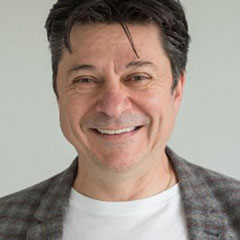Marian Ursu, Professor of Digital Creativity, School of Arts and Creative Technologies
Marian has a PhD in AI from Brunel University, UK (2000). He joined Goldsmiths University of London as a Lecturer in 1998 and was made Professor of Creative Computing in 2012.

During this time he transformed a traditional department of Computer Science and Mathematics into a department of “Creative Computing” – connecting digital technologies and the arts and related creative processes.
In 2013 he joined the University of York as Professor of Interactive Media and established the Interactive Media subject group in the department of Theatre Film and Television and Interactive Media and the Digital Creativity (DC) Labs (2015-2023).
He is currently Professor of Digital Creativity at York.
email: marian.ursu@york.ac.uk
Our 60-second interview with Marian:
Could you please tell us what work you do in the field of mental health?
My interest in the area of mental health is in finding how new forms of interaction that sit in between play (computer games) and storytelling (narrative media) could have a positive impact upon our mental wellbeing. In DC Labs we had a number of specific projects exploring this line of thinking, including Fight your Fears (led by Sebastian Deterding) – aiming to understand how computer games could be used to alleviate phobias – and Stepping Through (led by Simona Manni and Jon Hook) – aiming to understand how non-linear narratives could be employed as better means of representing mental health issues. Currently, I am directly involved in a project – Digital ComBAT – in which we research how digital companion apps could extend the positive impacts of behaviour activation beyond the period of therapy.
What do you find most rewarding and inspiring in this work?
One of the most rewarding aspects of this work is finding evidence of positive impact for new ideas – i.e. creative ways of employing interactive, immersive and artificially intelligent technologies in helping people identify and alleviate mental health problems.
What is the most challenging or complicated aspect of this work?
One of the most challenging aspects of this work is to devise mechanisms (digitally controlled, too) to ensure beyond doubt that “autonomous media”, once “unleashed” and allowed to interact with people, won’t harm them. Theoretically, “beyond doubt” is not always possible, so finding the assurance thresholds at which we can say “it is fine to use it”, can be hugely challenging. Another major challenge is finding solutions which are generalizable, at least partly. There are so many delicate nuances in this space, depending upon the individual circumstances of each person, which make generalisation a very hard and complicated problem.
What impact do you hope your work is having - or can potentially have?
Find scalable solutions to this societal issue whose reach started to be truly acknowledged only recently. I believe this is possible only through digital technologies, either to establish better channels of communication between people or to be used as autonomous entities.
Could you share with us one piece of advice that you follow for your own mental health?
When the pressures of work are too intense and the work environment appears antagonistic rather than supportive, I try to disconnect for a short period of time. The negative emotions lose intensity and, when I return, the landscape of issues appears easier to tackle. It doesn’t always work!